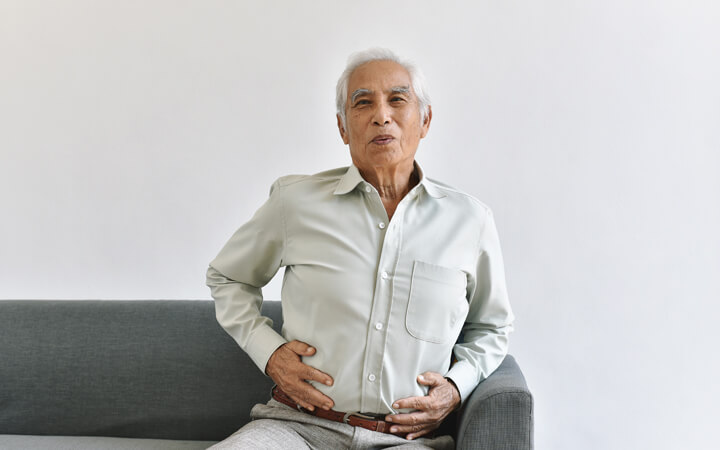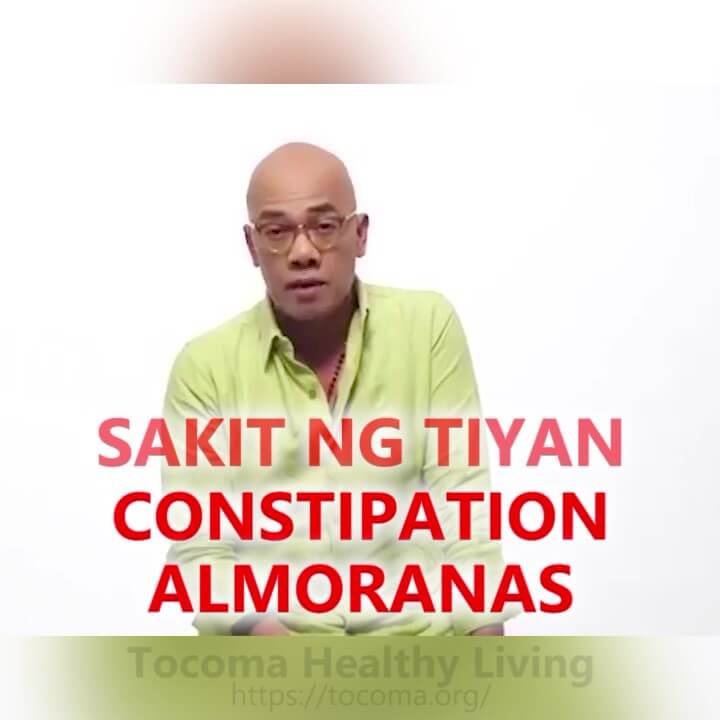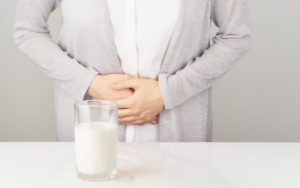This article will answer the question posted in our website comment that read as follows:
“I often experience bloating when I am inside an air-conditioned room or bus. My stool is more often loose and I have a chronic farting. Are all these things suggestive of a colon cancer ailments?”
Do you frequently experience bloating when you are inside an air-conditioned room or bus? Do you suffer from flatulence (farting) and loose stools? Bloating, flatulence, and loose stools are often caused by several factors – it is not always an indication that you have colon cancer.
So, before you panic, read this article to learn more about the possible causes behind your condition and when to see your doctor.
Bloating: Causes, Symptoms, Diagnosis, and Treatments
Bloating occurs in your abdomen and it happens when your gastrointestinal tract is filled with gas or air. When you are bloated, you feel as though you’ve eaten a big meal and there’s no more room in your stomach. Your stomach feels tight and full. It can be painful and uncomfortable. Your stomach may even look bigger.
Causes. Bloating can be caused by something as simple as the food that you eat – some foods produce more gas than others. It can also be caused by lactose intolerance. Other causes of bloating may include:
- Overeating
- Constipating
- Gastroesophageal Reflux Disease (GERD)
- Menstruation (in some women)
- Swallowing air (this can happen when you eat too fast, chew gum, or smoke)
Other causes of bloating could include medical conditions, such as:
- Infection
- Irritable bowel syndrome
- Pelvic inflammatory disease
- Chron’s disease
- Liver disease
- Blockage in your bladder or bowel
- Cancer (stomach, pancreatic, uterine, ovarian, or colon cancers)
Symptoms. Common symptoms of bloating include gas, stomach pain, and discomfort. You may also belch or burp frequently or have abdominal gurgling or rumbling. Severe bloating may occur with other symptoms, such as:
- Nausea
- Vomiting
- Diarrhea
- Heartburn (one that’s getting worse)
- Fever (due to an infection)
- Blood in the stool
- Vaginal bleeding (between your periods, or if you’re postmenopausal)
If you have any of these symptoms along with bloating, contact your doctor.
Diagnosis. Generally, your doctor can diagnose the cause of your bloating through a physical examination in the office. Your doctor will ask you questions about your symptoms, and they will want to know if your bloating is occasional or if it happens all the time.
Typically, temporary bloating is not serious. However, if it happens all the time, your doctor may order some tests, such as a CT scan or an X-ray so they could look inside your abdomen and identify what’s causing your bloating.
Treatment. For temporary bloating, ask your doctor about over-the-counter medications that relieve bloating and gas. If your bloating is caused by something more serious, your doctor will diagnose and treat the underlying cause.
Flatulence (Farting): Causes, Symptoms, Diagnosis, and Treatments
Flatulence is passing gas from the digestive system out of the back passage – it’s more commonly known as ‘farting’ or ‘passing wind’.
Farting is often laughed about; however, excessive flatulence can cause distress, embarrassment, and discomfort around others. This is particularly true if you are in an air-conditioned room, bus, or some other enclosed location. However, flatulence is a normal biological process and it is something that everyone experiences regularly. Some people fart only a few times a day – others a lot more – but the average is said to be around 5 to 15 times a day.
In most cases, a change of diet and lifestyle can help control excessive flatulence.
Causes. Flatulence can be caused by normal bodily processes, or it can be the result of a condition that affects the digestive system. Flatulence can be exogenous or endogenous causes.
- Exogenous sources. These are sources that come from the outside. We swallow air when we drink, eat, or swallow saliva, particularly when excess saliva is produced due to reflux or nausea.
- Endogenous sources. These are sources that come from inside the gut. Gas may arise as a by-product of digestion of certain foods, or when foods are not digested completely. If any food is not completely digested by the stomach or small intestine, flatulence can occur when it reaches the large intestine.
Certain foods can also cause flatulence. Foods that cause flatulence tend to be those that are high in certain polysaccharides, especially oligosaccharides, like inulin. Some foods that can worsen flatulence include:
- Cereals (such as oats or wheats)
- Dairy produce
- Cashews
- Vegetables (such as broccoli, cabbage, cauliflower, turnips, onions, beans, leeks, and garlic)
- Yeast in baked products like bread
Aside from foods, certain conditions can also worsen flatulence. These includes:
- Underlying health conditions. Some chronic conditions can cause flatulence, such as ulcerative colitis or Chron’s disease. Some types of cancer can lead to a blockage in the intestines. Anyone who experiences a worsening or sudden increase in flatulence should see a doctor.
- Constipation. Feces can make it more difficult to expel excess gas. This can result in further accumulation and discomfort.
- Gallbladder problems. Cholecystitis and gallstones can cause additional gas.
- Laxatives. Regular and excessive laxative use can increase the risk of developing flatulence.
- Other causes. Other causes of flatulence may include pregnancy, pancreatitis, hernia, endometriosis, premenstrual syndrome, and others.
Symptoms. Farting is normal, but the amount varies between individuals and depends on a number of factors. Some people fart only a handful of times per day – others up to 40 times – but the average is around 15. Symptoms of excessive, or embarrassing, flatulence can include:
- Chronic farting
- Smelly farts
- Loud farting
- Abdominal discomfort and distention
- Rumblings in the lower abdomen
Diagnosis. A doctor may help diagnose the underlying cause of flatulence and suggest ways to relieve its symptoms. They will ask about your medical history, dietary habits, and they will perform a physical exam to determine whether there is any distension in the abdomen. They may also check for gas by tapping the abdomen and listening for a hollow sound.
A doctor may also ask about bowel movements, whether you experience any strain when passing stool, if you experience abdominal pain after meals, and how long flatulence has lasted. This can help determine whether the patient might have a condition that needs treatment.
Treatments. People who experience excessive flatulence should eliminate carbonated beverages, such as beer and soda. Foods such as cabbage, beans, broccoli, and cauliflower should be avoided. Milk and other dairy foods must be avoided. Non-dairy milk such as almond or soy milk can be used. Sucking on hard candies and chewing gum should be avoided.
If dietary and lifestyle changes are not enough to treat flatulence, over-the-counter medications may help. However, before taking any medications, please talk to your doctor first. This is especially important if you are on existing medications, as it may cause drug interactions.
Some digestive system disorders, such as IBS, can produce a sensation of excessive flatulence. See your doctor if you experience unusual flatulence, changes in bowel movements, abdominal pain, or any other uncomfortable symptom associated with digestion.
Loose Stool: Causes, Symptoms, Diagnosis, and Treatments
Loose stools are bowel movements that appear softer than normal – they can be shapeless, mushy, or watery. They are very common and are not always associated with any severe health risks.
Loose stools typically occur after eating, but can also happen at other points in the day. When loose stools consecutively occur on multiple occasions throughout the day, this is described as diarrhea.
Causes. There are many possible causes of loose stools. Some of its causes include:
- Food and drinks. Some food and drinks can cause loose stools. One of the most common cases is coffee as it stimulates the intestinal muscles. Spicy and oily foods are also a culprit, as they can irritate the stomach. Alcohol, fructose, and sugar alcohols can also cause loose stools.
- Lactose intolerance. If you suffer from lactose intolerance, loose stools may be a problem or you. People who are lactose intolerant don’t produce enough lactase, an enzyme required to break down dairy.
- Irritable bowel syndrome. Loose stools and diarrhea are common if you suffer from irritable bowel syndrome (IBS) – a disorder that affects the large intestine. You may also experience other symptoms, such as bloating, constipation, stomach pain, and gas.
- Ulcerative colitis. Ulcerative colitis is a chronic disorder that causes inflammation in the digestive system. Some people with this condition experience loose stools, as well as other symptoms like rectal bleeding, fatigue, weight loss, and pain.
Anyone can have loose stools at one point or another. Also, it can affect both children and adults of all ages.
However, some people are at a higher risk of having loose stools. If you have certain chronic health problems, such as celiac disease, irritable bowel syndrome, or ulcerative colitis, then you’re more likely to have loose stools.
Symptoms. Loose stools and diarrhea are not the same thing. If you have diarrhea, you will also have watery or loose stools. However, if you have loose stools from time to time, it doesn’t mean you have diarrhea.
In order for loose stools to be considered as diarrhea, it has to occur repeatedly. If you have loose stools three or more times each day, then it’s considered diarrhea.
The most common symptoms of loose stools include:
- Shapeless stools
- Mushy or soft stools
- Water stools
You may also experience other gastrointestinal symptoms, including stomach pain, stomach cramps, and nausea.
Diagnosis. In most cases, loose stools are temporary and resolve on their own. However, if your symptoms persist or if they get worse, and if you have chronic loose stools, it’s time to see your doctor.
See a doctor if you experience:
- Chronic loose stools
- Blood stools or diarrhea
- Stools that look black or tar-like
- Dizziness
- High fever
- Confusion
- Chills
- Severe stomach cramps and pain that don’t go away
Your doctor can properly diagnose your condition and recommend the appropriate treatment.
Treatments. Depending on the cause, treatments for loose stools can vary. Your doctor may recommend increasing your fiber intake or they may suggest diet changes. You may also need to take anti-diarrheal medications.
Immediate treatments to stop loose stools include:
- Staying hydrated
- Consuming more fiber
- Taking anti-diarrheal medications
- Avoid food and drinks that trigger loose stools
Long-term treatments to stop loose stools may include:
- Making dietary changes
- Taking probiotics
- Finding and treating underlying medical conditions that cause your loose stools
Conclusion
Bloating, flatulence, and loose stools are often caused by several factors – it is not always an indication that you have colon cancer.
Talk to your doctor about any concerns you may have and discuss the potential causes and treatment options for bloating, flatulence, and loose stools





